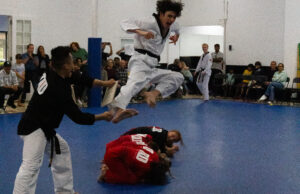Social media spurs a new wave of propaganda
For students living in America, the conflict that is occurring on the Gaza strip is extremely confusing to comprehend. As our government politically supports Israel, we are set up to believe this is a conflict between the Hamas group and their terrorist acts committed toward Jewish civilians. However, many Palestinians speak out that this issue is beyond Hamas, and it is the fault of the oppression and violence of Israeli Apartheid.
As social media users and news readers, we are easily able to grasp the immense tragedy of the situation, yet it is hard to assess exactly how and why it is happening. With being fed multiple but different truths from all over the world in a golden digital age, it is vital that we do our duty to educate ourselves beyond what social media presents before speaking out.
As students, many of us receive an overwhelming amount of information through social media. Social media can educate rapidly and extensively- however, it can just as infectiously misinform. Media is currently flooded with propaganda from both sides of the conflict. Many students deeply struggle to wade through influencer prejudice and violent imagery, unable to identify the extremely fine line between truth and psychological warfare.
This line is blurred not only by propaganda released on both ends of the conflict, but additionally by the beliefs of uneducated influencers. Impressionable students may fall directly into the pit of performative activism. Often, online, world issues are treated as carelessly as fashion trends. Everyone has an opinion until it is not “in style” anymore, disregarding whether or not the brutality has come to an end.
All it takes is a few flicks across a screen for youth to share passionate opinions on the conflict – regardless of how limited our perspective on the issue is. Even if a certain infographic or video contains real content, it does not always warrant a repost. The conflict in the Gaza Strip is a particularly violent one. The photos and videos released, although effective for evoking sympathies and demonstrating the depth of tragedy, can be psychologically damaging to those scrolling through their Instagram stories, unprepared to see such gruesome imagery. Those who still go on to repost these videos should be sensitive to their viewers, as well as educating themself as to what they are sharing and knowing its credibility.
Those who are directly impacted by the violence at hand all carry varying perspectives that many Americans cannot fully take in. Despite the pressure on Generation Z to improve society as previous generations have failed in their goals, it is crucial to be self-aware when one does not represent any ethnic group involved in the conflict they speak on. Though sharing these opinions may be evidence of our generation’s passion for progress, we risk perpetuating unjust prejudice.


